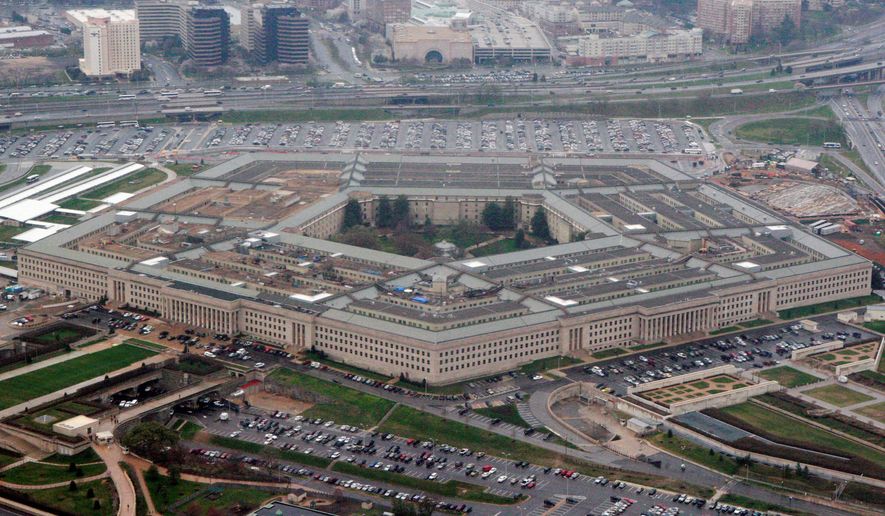The Navy has moved to block the appointment of a special investigator for accusations from a decorated Navy SEAL that two Pentagon admirals intervened in his sexual assault court-martial to make sure he was convicted.
In what is shaping up as an extraordinary court battle between admirals, government attorneys filed petitions asking the U.S. Court of Appeals for the Armed Forces, the military’s highest, to deny a request from Senior Chief Petty Officer Keith Barry to appoint an investigative special master.
An appeal that Chief Barry’s attorneys filed this month with the court says the Navy’s two highest-ranking lawyers committed unlawful command influence.
Retired Vice Adm. Nanette DeRenzi, then judge advocate general of the Navy, and her deputy, Vice Adm. James W. Crawford, in 2015 personally intervened with the admiral overseeing the chief’s court-martial and stopped his plans to exonerate the SEAL, the appeal says. Adm. Crawford is now the Navy’s top JAG.
Chief Barry’s main piece of evidence: a sworn affidavit from retired Rear Adm. Patrick J. Lorge, the trial’s convening authority who says his conscience prompted him to file the charges two years later, The Washington Times first reported.
The Navy has responded. Three Navy attorneys filed a motion on May 11 asking the appeals court to reject the bid for a special master and instead send the case to a convening authority admiral in San Diego, where the court-martial was held. That admiral would set up proceedings to investigate Mr. Lorge’s charges. In a twist, the convening authority would be appointed by the accused JAG, Adm. Crawford.
The Navy said Chief Barry’s rights would be protected.
“The subsequent convening authority action may be insulated from the appearance of impropriety by attaching a statement to the record that clarifies the judge advocate general’s impartiality and his desire for the newly appointed convening authority to exercise independent judgment,” the Navy argued.
But Chief Barry’s attorneys objected in a string of filings on May 18. They argue that sending the case back to another admiral rather than an independent investigator is “permission to sweep the unlawful command influence under the rug.”
“The military justice system failed [Chief] Barry the day the Convening Authority approved the findings in his case,” they told the court. “The political climate regarding sexual assault in the military became so toxic that it polluted the judgment of the senior leaders responsible for safeguarding its fair and impartial administration.”
The petition blames former President Barack Obama and his campaign against sexual assault in the military, as well as the two JAG admirals.
Mr. Lorge’s affidavit tells this story: After Chief Barry was convicted by a judge in a nonjury court-martial, the admiral, a former fighter pilot, considered a request for clemency. After reviewing the evidence, he told his legal advisers that he intended to override the guilty verdict.
Chief Barry’s defense was that he engaged in consensual anal intercourse on the last day of a monthlong intense sexual relationship with a woman he had met through a friend. The woman said she did not give permission for that type of contact after willingly being tied up by the defendant.
When his legal advisers heard the admiral say he planned to reverse the conviction, one or both notified the Navy high command. Next, Mr. Lorge received phone calls from Adms. DeRenzi and Crawford.
Adm. Crawford said such action would end Mr. Lorge’s career. Adm. DeRenzi talked to him about the importance of the Navy being viewed in Congress as tough on sexual assault. After the discussions, Mr. Lorge approved the conviction.
“She mentioned that every three or four months military commanders were making court-martial decisions that got questioned by Congress and other political and military leaders, including the president,” Mr. Lorge wrote of Adm. DeRenzi. “This conversation reinforced my perception of the political pressures the Navy faced at the time.”
In a direct message to the appellate judges, Mr. Lorge said: “On a personal note, I would ask you to forgive my failure in leadership and right the wrong that I committed in this case against Senior Chief Barry; ensure justice prevails and when doubt exists, allow a man to remain innocent.”
The appeal was filed by attorney David P. Sheldon and Navy Lt. Jacob E. Meusch, a judge advocate.
Their May 18 argument reads: “RADM Lorge changed positions. Prior to his conversation with Vice Adm. Crawford he was convinced he should disapprove the findings. After his conversations with Vice Adm. Crawford, Rear Adm. Lorge was still convinced that he should disapprove the findings, but instead approved the sentence in order to avoid the appearance that the military was ’sweeping sexual assaults under the rug.’”
Mr. Sheldon told The Times: “Now, by moving to remand Senior Chief Barry’s case for a new approval decision from a new admiral, the Navy is attempting to sweep the actions of Admiral Crawford and Admiral DeRenzi under the rug. Such a result would be unconscionable and further undermines the legitimacy of the military’s justice system.”
The judge sentenced Chief Barry to three years in prison and a dishonorable discharge. He has served 30 months and is out of prison on what Mr. Sheldon said is “appellant leave.”
He was in combat in Iraq and earned the Navy Commendation Medal with valor, among a number of other commendations. Mr. Sheldon said Chief Barry suffers from traumatic brain injury “from being exposed to repetitive IED explosions.”
• Rowan Scarborough can be reached at rscarborough@washingtontimes.com.




Please read our comment policy before commenting.